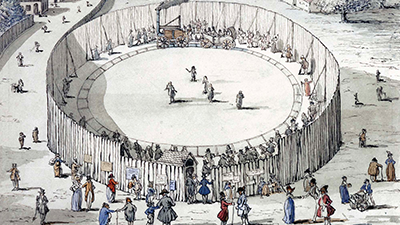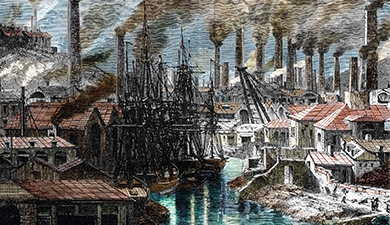The Industrial Revolution Begins
Driving Question: What factors drove the expansion of industrial production and ultimately led to the Industrial Revolution?
The Industrial Revolution led to rapid change in the world. This lesson focuses on the origins of the Industrial Revolution, the global transformations that occurred as a result, and the long-term impacts of the rise of industrialization.
Learning Objectives
- Analyze the scale of the Industrial Revolution and its impact on various regions of the world.
- Evaluate how the Industrial Revolution changed states and societies in the long nineteenth century.
- Describe how innovations made possible by the Industrial Revolution developed and changed over time.
- Explain how environmental factors contributed to industrialization from 1750 to 1900.
Vocab Terms:
- fossil fuel
- industrial capitalist
- industrialization
- innovation
- locomotion
- manufacture
- textile
Opener: Industrial Revolution Begins
To teach this lesson step, refer to page 3 of the Lesson 5.3 Teaching Guide.
Our Openers and Closers Guide helps you maximize key moments at the start and end of each lesson.
You’ve learned a lot about revolutions. Before you learn about the Industrial Revolution, reflect on what the ingredients of revolution are.
Macartney’s Expedition and the Global Economy
To teach this lesson step, refer to page 3 of the Lesson 5.3 Teaching Guide.
How did the global economy shift from Asia to Europe in the nineteenth century? The answer may lie with Lord Macartney and his expedition to China in 1793.
-
Guiding Questions
-
Before you watch
Preview the questions below, and then review the transcript.
While you watch
Look for answers to these questions:
- Why was Portsmouth important?
- Where was the economic center of the world at the end of the eighteenth century?
- Why were Europeans more interested in trade with China than the Chinese were in trade with Europe?
- What roles did the European powers in the Indian Ocean (other than Britain) play in the global economy?
- Why did Lord Macartney travel to China?
- Did Macartney succeed? Why or why not?
After you watch
Respond to the following questions:
- Do you think China or Britain had the stronger economy in 1793? Which would you predict would become the economic powerhouse of the nineteenth century? Why?
- How were British and Chinese society similar in 1793? How were they different?
Key Ideas
Scale of the Industrial Revolution
To teach this lesson step, refer to page 4 of the Lesson 5.3 Teaching Guide.
Have you ever thought about exactly when certain historical events first started? Can it always be narrowed down to one date or one event?
-
Guiding Questions
-
Before you read
Preview the questions below, and then skim the article. Be sure to look at the section headings and any images.
While you read
Look for answers to these questions:
- What geographic factors helped Britain industrialize first?
- What factors held back early industrialization in China and Japan?
- What social factors helped Britain industrialize first?
- How might the institution of slavery have helped cause industrialization?
- Other than plantations, what global advantages did Britain have?
After you read
Respond to the following questions:
- To what extent does this article explain the development of economic systems, ideologies, and institutions and how they contributed to change in the period from 1750 to 1900?
- The author concludes that the reasons for Britain’s industrialization were both local and global. But if you had to choose one scale as the explanation for Britain’s early industrialization, which would you choose? Which AP theme provides the best evidence to support your argument?
Transformation of Manchester
Check out these before and after images to draw conclusions about the impacts of the Industrial Revolution on Manchester, England.
Images of the Industrial Revolution
Origins of the Industrial Revolution
To teach this lesson step, refer to page 5 of the Lesson 5.3 Teaching Guide.
What factors allow one to be first in something? Is it luck? Is it skill? In the case of Britain, it was a combination of many factors: environmental, economic, and even its global reach.
-
Guiding Questions
-
Before you watch
Preview the questions below, and then review the transcript.
While you watch
Look for answers to these questions:
- How did coal and other environmental factors help Britain industrialize first?
- How did coal mining change over the course of the Industrial Revolution?
- How did England’s pre-industrial wool industry help it industrialize?
- How did Britain’s financial system help launch new industrial ventures?
- How might high wages in Britain have contributed to industrialization there?
- What global factors may have fed Britain’s industrialization?
After you watch
Respond to the following questions:
- This video provides a look at some of the possible causes of Britain’s early industrialization. Which factor do you think was the most important? Why?
- Using evidence from this video, provide one impact of industrialization on networks, communities, and production and distribution in Britain.
Key Ideas
The Industrial Revolution
To teach this lesson step, refer to page 7 of the Lesson 5.3 Teaching Guide.
Natural resources led to a massive expansion of industry and trade in the nineteenth century. But why did it happen in some places and not others?
-
Guiding Questions
-
Before you read
Preview the questions below, and then skim the article. Be sure to look at the section headings and any images.
While you read
Look for answers to these questions:
- What was the initial reason that people in Britain started mining coal?
- How did the fact that wet conditions made British coal hard to get to turn into an advantage for Britain?
- Why did the Industrial Revolution spread out of Britain?
- What were some consequences of the Industrial Revolution?
After you read
Respond to the following questions:
- To what extent does this article explain how different modes and locations of production have developed and changed over time?
- The article about scale and the Industrial Revolution listed British population increases as a reason for early British industrialization. In this article, however, the author says that China’s large, rapidly growing population was a reason that China did not industrialize early. Do you think the authors disagree? If so, with whom do you agree?
Images of the Industrial Revolution
To teach this lesson step, refer to page 8 of the Lesson 5.3 Teaching Guide.
Help students decode visuals with Three-Step Reading: first the big picture, then the details, then the meaning. Check out page 3 of our Reading Guide for more.
You’ve heard the expression a picture is worth a thousand words, right? Well, we don’t expect you to write thousands of words, but you will explore pre- and post-industrialization images to identify change over time!
Closer: Industrial Revolution Begins
To teach this lesson step, refer to page 9 of the Lesson 5.3 Teaching Guide.
Looking for additional supports for creating revolution recipes? Read Scaffolding “Recipe for a Revolution” with hexagonal thinking.
Earlier in the lesson, you reviewed what you knew about the ingredients needed for a revolution. Now that you know about the Industrial Revolution, has your shopping list changed?


























